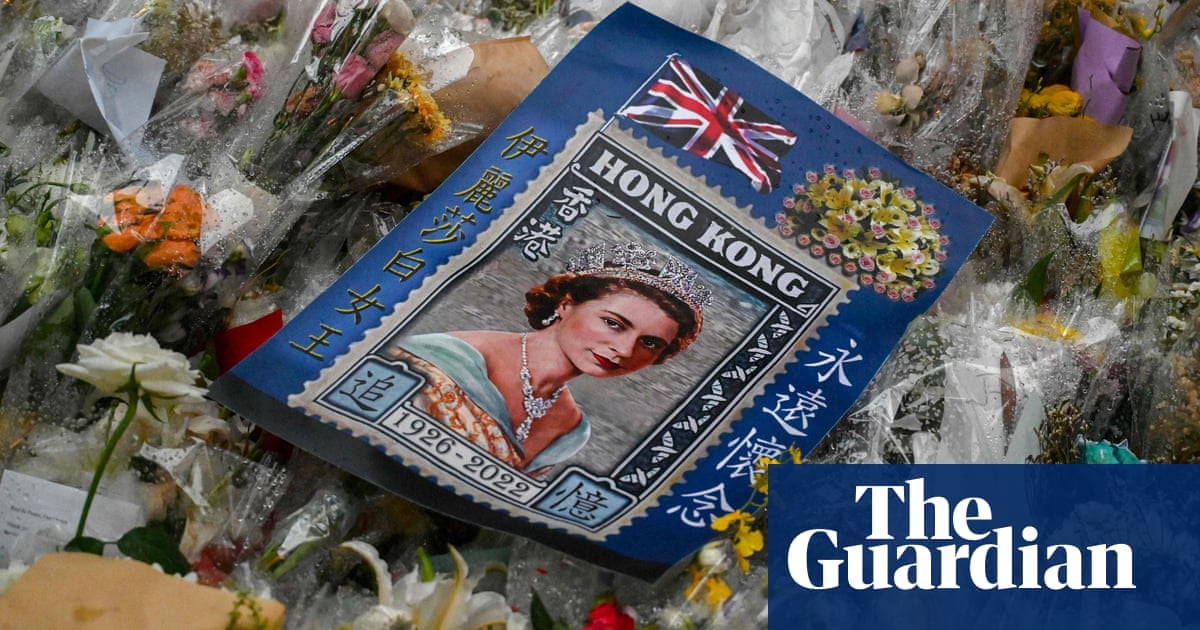Hong Kong arrests harmonica player at Queen vigil for sedition
Show caption Flower tributes for Elizabeth II placed outside the British consulate in Hong Kong. Photograph: Peter Parks/AFP/Getty Images Hong Kong Hong Kong arrests harmonica player at Queen vigil for sedition Man played British national anthem and pro-democracy protest song to crowds gathered during funeral Agence France-Presse in Hong Kong Tue 20 Sep 2022 14.49 BST Share on Facebook
Share on Twitter
Share via Email
A Hongkonger who played a harmonica to a crowd outside the British consulate during Elizabeth II’s funeral was arrested for sedition, according to police and local media
Crowds of Hongkongers have queued to pay tribute to Britain’s late monarch this week, some expressing nostalgia for the city’s colonial past at a time when Beijing is seeking to purge dissent.
Hundreds gathered outside the consulate on Monday evening as Britain was holding a state funeral, sharing live streams on phones as well as laying candles and flowers.
At one point, a man started to play songs on a harmonica, according to an AFP reporter on the scene, including the British national anthem and Glory to Hong Kong, a popular song during huge, sometimes violent pro-democracy protests in 2019.
The mourners outside the consulate applauded the performance and shone their phone lights, with many later shouting the protest chant “Hongkongers add oil” and singing Glory to Hong Kong.
Local reporters later photographed the harmonica player being questioned by police and detained.
On Tuesday, police said a 43-year-old man surnamed Pang was arrested outside the consulate for “seditious acts”. A police source confirmed to AFP that the man arrested was the harmonica player.
Past 8pm, people outside BCG chanted “Hong Kongers Add Oil” and sang a section of “Glory to Hong Kong” after a man began to play harmonica on the pavement across the consular building. pic.twitter.com/ufQ1DHuyGz — Xinqi Su 蘇昕琪 (@XinqiSu) September 19, 2022
After 2019’s democracy protests, China has cracked down on dissent in Hong Kong using national security legislation and charges of sedition.
The latter is a colonial-era law that had fallen into obscurity for decades until prosecutors reintroduced it in the aftermath of the protests.
The song Glory to Hong Kong contains the popular protest chant “liberate Hong Kong, revolution of our times”, which has been declared by the courts to be a threat to national security.
A man in his 60s was charged earlier this year for performing without a licence after playing the song on his erhu, a Chinese two-stringed instrument, at a bus terminus.
Oliver Ma a Filipino-Hong Kong buskerwas arrested three times in 2020 and 2021 when singing the English version of the protest song on Hong Kong streets.
Hong Kong was a British colony for more than 150 years and while the financial hub was returned to China in 1997, the past is engraved into its landscape, from street names and the ubiquity of English to the common law legal system.
In the week since the Queen’s death more than 13,000 people signed a condolence book in the city’s British consulate.













